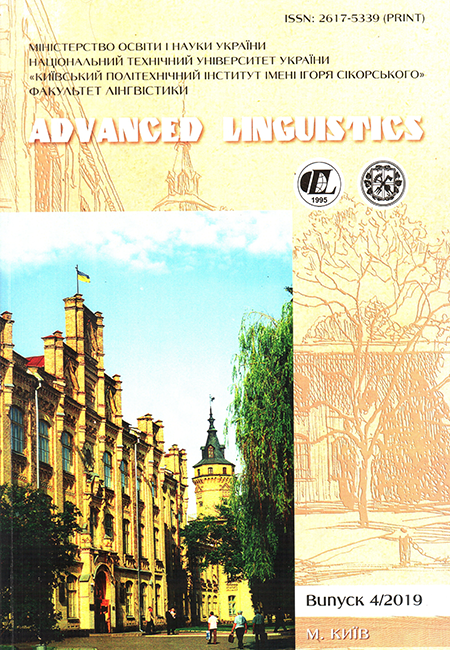COMPARISON OF AUTOMATIC SYSTEMS OF TERMS’ EXTRACTION
DOI:
https://doi.org/10.20535/2617-5339.2019.4.189753Ключові слова:
terminology, terms extraction, automatic extraction systems, extraction software, terms extraction software, translation of termsАнотація
Nowadays the processes of translation become more unified, and translators depend not only on their knowledge and sense of language, but also on various software, which facilitate the process of translation. The following article is devoted to one branch of such software, the systems of automatic extraction, which are an essential part in the process of lexicographic sources development of translation of text, which include a variety of terms. Consequently, the necessity to choose among the variety of different programs arose and the results of this research i.e. the comparison of functions of different programs, are described in our article. Several criteria, by which the quality of terms extraction can be measured, have been compared, e.g., the speed of extraction, the “purity” of the output list of terms, whether the extracted lexical material corresponded to the requirements to terms, the quality of irrelevant choices, extracted by automatic extraction systems, and the factors, influencing this quality, etc. The advantages and disadvantages of cloud and desktop services have been investigated and compared. It was noted that the main difficulty is that programs still are not able to distinguish between word forms, thus the texts that undergo the extraction process, require auxiliary procedures such as POS-marking, lemmatization and tokenization. The other obstacle was the inability of certain programs to distinguish between compound terms and simple word combinations. The key points of the research may be used in the course of translation studies, in researches devoted to “smart” or electronic lexicography and by translators in general as they may use these systems of terms extraction during the process of translation for the purpose of forming or unifying the required glossary.Посилання
Candel-Mora, Miguel & Carrio-Pastor, María. (2014). Terminology Standardization Strategies towards the Consolidation of the European Higher Education Area. Procedia - Social and Behavioral Sciences. 116. 166–171. 10.1016/j.sbspro.2014.01.187.
Term Extraction Editor. (n.d.). Retrieved November 20, 2019, from https://help.memoq.com/current/en/Places/term-extraction-editor.html.
Sdl Multiterm Extract Tools User Guide. (2011). Retrieved from http://downloadcenter.sdl.com/T2011/Docs/SDL_MultiTerm_2011_Extract_User_Guide.pdf
CST's Lemmatiser . (n.d.). Retrieved November 20, 2019, from https://cst.dk/online/lemmatiser/uk/.
Tilde Terminology. (n.d.). Retrieved November 20, 2019, from https://term.tilde.com/
Global, L. (n.d.). Prospector. Retrieved November 20, 2019, from https://logrusglobal.com/prospector.html.
Computing, L. (n.d.). One Click Terms. Term Extractor. Retrieved November 20, 2019, from https://terms.sketchengine.eu/.
##submission.downloads##
Опубліковано
Номер
Розділ
Ліцензія
Наше видання використовує положення про авторські права CREATIVE COMMONS для журналів відкритого доступу.
Автори, які публікуються у цьому журналі, погоджуються з наступними умовами:
1. Автори залишають за собою право на авторство своєї роботи та передають журналу право першої публікації цієї роботи на умовах ліцензії Creative Commons Attribution License, котра дозволяє іншим особам вільно розповсюджувати опубліковану роботу з обов'язковим посиланням на авторів оригінальної роботи та першу публікацію роботи у цьому журналі.
2. Автори мають право укладати самостійні додаткові угоди щодо неексклюзивного розповсюдження роботи у тому вигляді, в якому вона була опублікована цим журналом (наприклад, розміщувати роботу в електронному сховищі установи або публікувати у складі монографії), за умови збереження посилання на першу публікацію роботи у цьому журналі.

